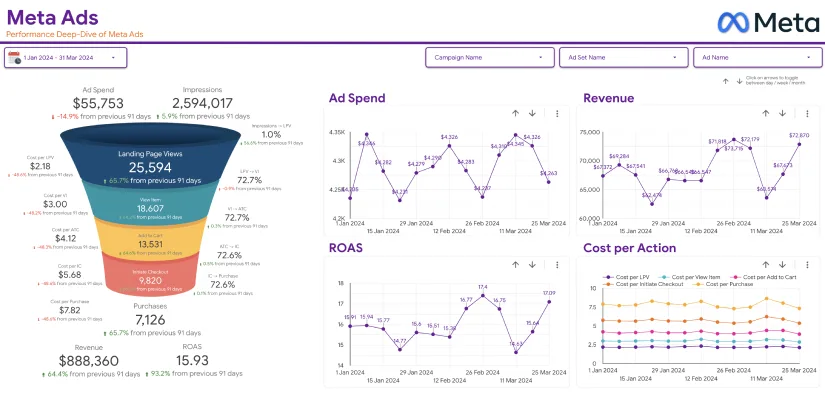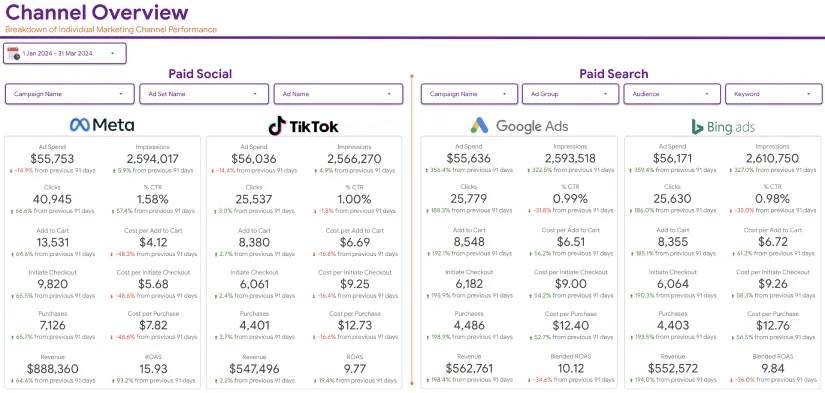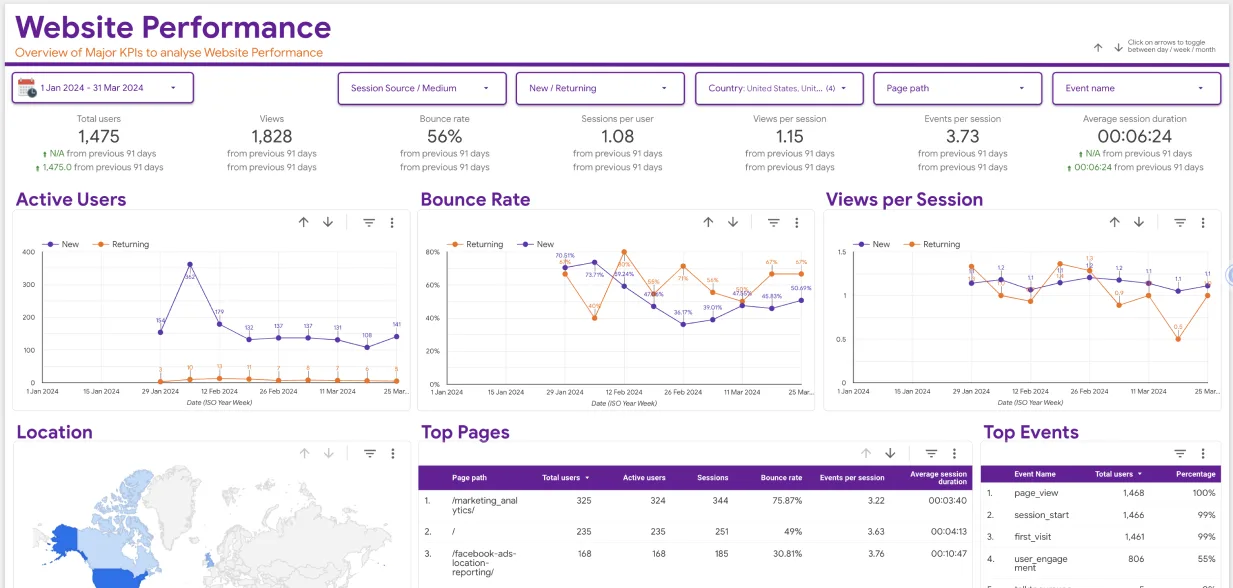A Google Analytics Search Terms Report is an invaluable tool if you do digital marketing. It gathers search terms that potential customers use to search for things in your niche. Armed with a GA search term report, you can prevent wasting time and money on some ads.
Additionally, it can help you stand out in a competitive industry or niche. With this GA report, you can refine your keyword research strategy to gather phrases to drive traffic to your site. If you understand little about this crucial report, here is your chance.
This article describes the search term report in detail. Read on to know what this report is about, why you should use it, and where it is in your Google Ads account.
Google Analytics Search Terms Report – Why You Need It
Google Analytics 4 tracks user interactions by default. It reports on users’ search behaviors but does not reveal the specific search terms they use. GA can tell you how many visitors you received yesterday, which page they liked the most, where they came from, what product they viewed or bought, etc.
However, it won’t show you the exact search terms they typed on Google to land on your website. If you plan to know what your site visitors need, you should configure your tool to generate a Google Analytics Search Terms Report. An on-site search term report has many benefits to offer you:

- Identifies Problematic Areas – Web users may be searching for a product or service in your niche without success. If you have a Google Analytics Search Term Report, it can help you identify the exact phrases potential leads use to search for products or services in your niche. If you are already targeting these phrases, you will want to discover why users do not find your offerings. That can make you want to check if your internal linking structure has a technical issue.
- Indicates Unsatisfied Demand – Perhaps web visitors need an item you do not offer now. It can be a product, service, or data. A Google Analytics Search Terms Report can reveal this unfulfilled demand by providing the query terms web users use to find items not on your website. Therefore, you can alter your content, product, or service development strategies to meet the unsatisfied demand soon.
- Guides Organic and Paid Search Strategies– GA cannot help you tell the exact items visitors desperately seek. But, if you alter its settings to add a Google Analytics Search Term Report option, it will generate this information. Once you know what visitors in your niche want, you can refine your SEO and paid search advertising strategies. For example, you can create a category page targeting the most popular search terms. Review existing site content to ensure it is suitable for the season. Align your pay-per-click advertising campaigns with search terms and language your customers use. Lastly, update your advertising budget and bids to increase the visibility of given products or services when the demand is high.
- Optimizes User Experience – A Google Analytics Search Terms Report can enhance user experience. It can help you improve your keyword research strategy to target the phrases people use to find your site. Moreover, you can improve user experience by revising your on-site SEO to speed up the site loading time and ease its navigation process. You can also create new pages with the most sought-after content. Ensure it contains the search terms.
A Google Analytics Search Terms Report connects you with the target visitor’s needs and interests. This knowledge is beneficial for promoting user experience and upgrading your website performance.
How to Configure Search Terms Tracking in Google Analytics

As earlier noted, Google Analytics 4 does not track search terms automatically. Instead, it provides insights into how web users interact with your website. After explaining the benefits of having a search terms report in GA4, you now want to know how to set it up in Google Analytics 4. Enabling on-site search term tracking in Google Analytics is easy if you follow these steps:
Step 1: Enable Site Search in Google Analytics 4
- Open your Google Analytics 4’s “Admin” area.
- Underneath “Data Collection and Modification,” hit “Data Streams.” Choose your site’s data stream.
- Navigate to the “Events” section and enable “Enhanced Measurement.”
- Click the gear icon to view advanced settings and enable “Site Search.”
Step 2: Identify the Site’s Search Query Parameter
- Conduct a site search to find the search term query parameter. In a URL, a search query often appears before the equals sign (=).
- Check the parameter field in Google Analytics to ensure a listed search query. If you see none, you can add it to the list. Alternatively, substitute the existing search query parameter with your version.
- Tap the “Save” button to store the configuration. Find it in the top right corner of the “Enhanced Measurement Settings” tab.
Google Analytics 4 won’t produce a search terms report with just the above configuration. Create a custom dimension to ensure Search Terms Report Google Analytics -10 works. Here is how to do it:
- Move to the “Admin” area and hit “Data Display.”
- Choose “Custom Definitions.”
- Hit the “Create a Custom Dimension” tab to create the “search term” custom dimension.
- Move to the right corner at the top and click “Save.”
Evaluate your Search Terms in Google Analytics 4
After setting up the on-site configuration, and search terms custom dimension, you can assess your Google Analytics Search Terms Report. Here is how to do it:
- Open the “Events” report. Then, choose the “view search results” event.
- Hit the “view search results” event to access the event dashboard.
- Review the “search term” data card. It displays the search terms used to locate items in your niche. It also reveals the event count. This is usually the number of times users have searched a given search term within the chosen duration.
- Lastly, the data card displays various user metrics.

At this point, you can optimize your site and advertising campaigns with the data you have gathered from the Google Analytics Search Terms Report. Analyze this data with filters and other comparison tools to study customers’ needs, behaviors, and patterns.
You can understand your target audience deeply by taking advantage of the on-site search terms report in your GA4. After that, you can make more constructive decisions to improve your website performance and user experience.
Mistakes Not to Make with the GA Search Terms Report
A Google Analytics Search Terms Report is a high-quality and beneficial tool. However, there are a few things you can do to reduce your odds of success with it. Here they are:
- Create Advertising Campaigns devoid of the search terms report – The report has search terms rather than keywords. If you evaluate these search terms, they can give you a hint on the best keywords to target. By ignoring the search terms report, you automatically miss this opportunity.
- Using irrelevant Search Terms – Although search terms help you read the customer’s mind when shopping, some are irrelevant. If you include them in your advertising strategy, you could waste your time and money. That’s because your ads will display search queries that do not align with your product or service niche.
- Failure to Alter Your Bids – A Google Analytics Search Terms Report can often show search queries in high demand. Do not dismiss these queries as they can increase your lead attraction and conversion rates. Instead, increase your bidding budget to increase your campaign’s odds of success.
- Irregular Review of the Search Terms Report – Some marketers will assess their Google Analytics Search Terms Report only when creating an ads campaign. Then, they forget it for a while. This infrequent review of the report can make you miss vital market trends and seasonal opportunities to sell more. Check your search terms report often to seize opportunities that can optimize your site performance.
- Failure to explore the User Intent – User intent is a crucial part of search engine optimization. By understanding a user’s intent when using given search terms, you can create the most relevant SEO site content. Did they intend to transact or gather information? Write content that reflects the user’s intent.
Achieving Success with the Search Terms Report

A Google Analytics Search Terms Report provides priceless data for digital marketers and sellers. Just as you need to avoid mistakes when using the report, you should know how to use it to optimize your organic and paid marketing campaigns. Here are a few hints:
- Carry out keyword research- The search terms already boast a high search volume. Therefore, you should use them to gather keyword ideas.
- Optimize Your Landing Pages – A landing page is an essential part of your website. So, add search terms that your target audience uses to locate your product or service. Additionally, optimize your landing pages with keywords that relate to the search terms. That way, you can attract relevant leads and enhance your search engine rankings.
- Negative Keywords – A negative keyword consists of a partial section of the search term it relates to. Do not ignore these keywords, as they can attract ready-to-convert users.
Conclusion
Google Analytics Search Term Report is an ideal tool for creating a relevant ad strategy. If you use it carefully, it can help you revise your ad campaigns, bidding budget, and site content. It can improve your ROI by offering you the exact search terms your target customers use to look for things on Google.





